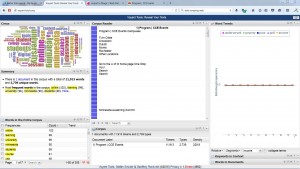Last week, July 13–17, I attended a National Endowment for the Humanities Institute on Digital Humanities. This post is summarizes my reflections and attempts to point the way forward for my teaching.
You’ll recall my original project had four parts:
- Create a course that adhered to an anti-poverty pedagogy course design principles.
- Use only texts that were free to students (OER and library databases).
- Build the course around digital history tools (that are part of the larger digital humanities–or DH– world).
- Package the course and give it away.
I failed slightly less than I succeeded. Still, I believe I can realistically still accomplish this goal, in fact for two world history courses. Part of my confidence derives from my time at last week’s institute (#dhatthecc).
I learned too much for single post so I’ll just list three problems for which I have new options.
Problem: Students have too many DH website that require new logins.
Option: In the first iteration of my DH world 2 course, I had students create Omeka, google, ARC GIS, and a cloud storage accounts. Following an nice intro by @roopikarisam to how to install Omeka on @reclaimhosting serve, I was able to install serval plugins for Omeka. These plugins (versions of Neatline) will let students use Omeka for 5 lesson plans instead of 1, decreasing the mental bandwidth needed to learn a new user interface.
Problem: Assessment of digital projects borrows heavily from face-to-face assessment and lacks a nuanced estimation of DH competence.
Option: An short article in Digital_Humanites titled “Learning Outcomes For The Digital Humanities” helped me think through how to restructure my assessment rubrics in a way that honors the student contributions as DH creators and historical thinkers.
Problem: Students lack agency in what they want to get out of assignments.
Option: Jesse Stommel strongly encouraged participants at #dhatthecc to allow students to self-assess the success of an assignment. I am perhaps less willing to allow students to define all the outcomes for an assignment, yet I do think I’ve been missing an adrogological opportunity to include students in the assessment. I have content, skill, and metacognitive outcomes for my assignments, and @jessifer convinced me I should include a fourth category, something akin to “What do you want to get out of this assignment?” learning outcome on each assignment. Importantly, I think I can ask the students to self-assess and include their self-abasement in the assignment grade.
This is just the first of many thoughts on #dhatthecc . Many more thoughts and thank you to follow.
Safe home.
